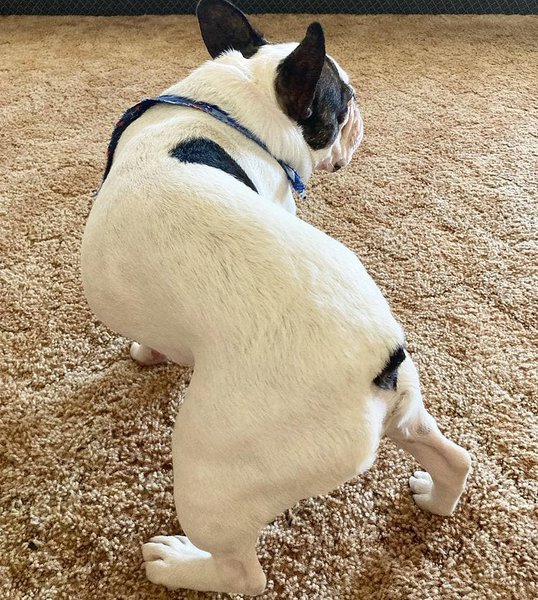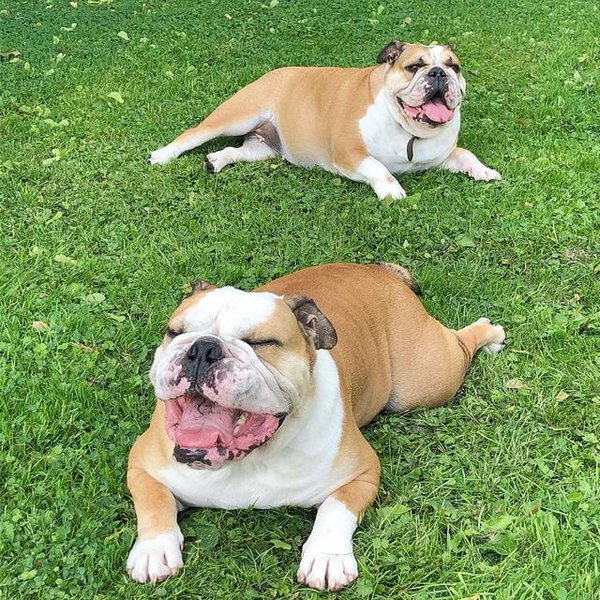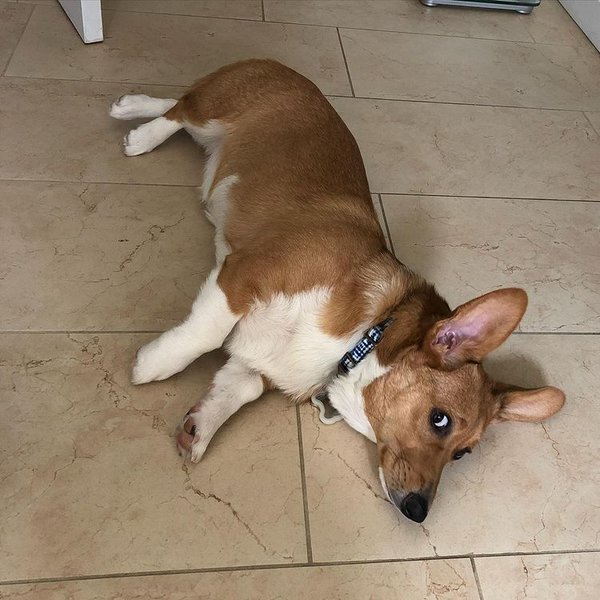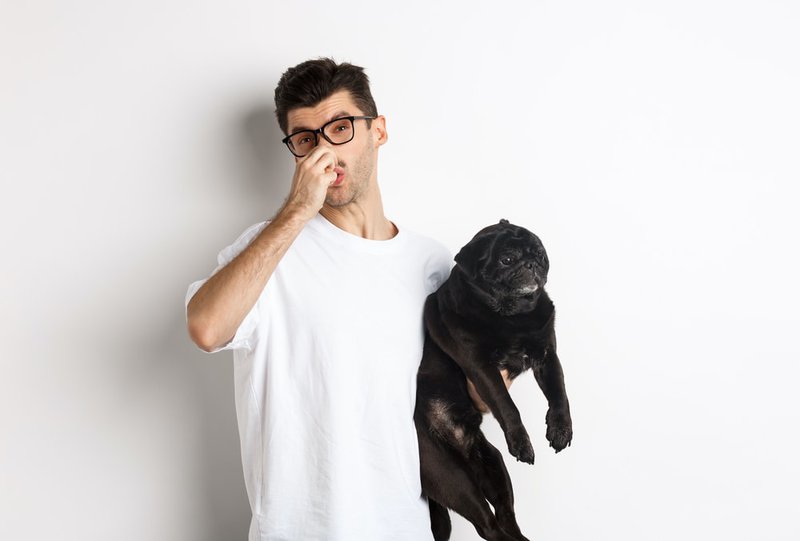If you own a pooch, then there’s every chance that Fido has once let out a nasty-smelling fart that caused you to run from the room. Canine farts are a normal occurrence, but there are situations where your pooch’s incessant farts can mean something else.
So, why do dogs fart? Dogs fart for a variety of reasons including sudden inappropriate changes in the pooch’s diet, feeding the dog with low-quality, indigestible food, and poor feeding habits such as eating too fast. Additionally, excessive farting in a dog can also be due to the presence of a disease or infection in the dog.
As inferred from the answer paragraph, canine flatulence, as silly as it may sound, can also be a potentially serious situation, which is why you should take no chances when you observe your pooch farting more frequently than usual. Steps to take, when your pooch just won’t stop farting, as well as the common treatment methods for this medical condition, are all outlined in this article. But before we go into all that, let’s take a closer look at the reasons for farting in dogs.
Why Do Dogs Fart?

Common reasons for canine flatulence include sudden changes in the dog’s diet, consumption of unsuitable and indigestible food by a dog, and the pooch swallowing an excessive amount of air. Similarly, excessive farting by a dog can also be induced by an underlying medical condition.
Problems With The Dog’s Diet And Feeding Habits
The major reason for farting in dogs is a problem with the pooch’s diet, and some of the common dietary issues that lead to farting in dogs are outlined below:
Abrupt Changes In The Dog’s Diet
Unlike humans, the canine digestive system isn’t suitably equipped to handle eating different foods on a daily basis. And if a dog is suddenly presented with a food substance, different from what it is used to eating, there is every chance of the pooch suffering a stomach upset and subsequent uncontrollable release of gas.
Feeding The Dog With Unsuitable Food
Another reason for farting among dogs is the consumption of human-grade food and table scraps that create a digestion problem for dogs. The consumption of low-grade food with indigestible ingredients is also culpable in the development of canine flatulence.
Common food substances that dogs typically find difficult to digest, and which may induce farts in a pooch include soybeans, peas, fruits, spices, and sugary substances. Food substances with a high-fat content have also been known to promote gas build-up within a pooch’s stomach and subsequent flatulence.
Lactose-intolerant dogs also find it difficult to digest dairy products such as milk, yogurt, and cheese, and the consumption of these food substances typically results in indigestion, diarrhea, and excessive farting in dogs.
Swallowing Excessive Air
Another reason for canine farts is the swallowing of excessive amounts of air by the pooch in question. Swallowing of too much air typically happens when a dog is running too fast or if the pooch in question eats its food too quickly. And as this air needs to find a way out of the pooch’s body, it typically results in excessive farting.
Flatulence that occurs as a result of a dog swallowing excessive amounts of air can be distinguished from farts caused by dietary issues by the absence of the characteristic bad odor that is common with the latter.
An Underlying Health Condition
The reason for farting by a pooch can run deeper than a simple problem with the pooch’s diet, and at times, a dog’s fart can be an indicator of a serious underlying medical condition.
Some of the medical conditions that are typically responsible for flatulence in dogs include the presence of intestinal parasites, inflammatory bowel diseases, irritable bowel syndrome, food allergies, pancreatitis, and the development of tumors, just to mention a few.
Dog Breeds Susceptible To Flatulence
It is also worth noting that certain dog breeds are more predisposed to suffering from canine flatulence than others.
Brachycephalic dog breeds, such as Boxers and Bulldogs, typically have shorter and flatter faces than encouraging the inhalation of more air than usual. And as this excess air has to find a way out of the pooch’s body, the dog in question may start farting excessively.
What Should I Do When My Dog Won’t Stop Farting?

If your canine buddy won’t stop farting, you should contact your vet to check for the presence of infections and diseases.
Farting in dogs, just as with humans, is a normal natural reaction, so far it is done in moderation and isn’t accompanied by additional symptoms. If, however, you observe the presence of unusual symptoms, along with your pooch’s excessive farting, then a call to the vet is in order.
Contact Your Vet
We’ve mentioned earlier how farting in dogs can be caused by an underlying medical condition. And if your canine buddy just won’t stop farting, coupled with the presence of additional symptoms such as:
The next course of action is to book an appointment with your vet to check for and rule out diseases and infections. You may also be required to bring along a sample of your dog’s stool to check for the presence of intestinal parasites.
Similarly, canine flatulence can also be due to dietary issues, and a vet is also suitably equipped to diagnose problems with what and how you’re feeding your canine buddy.
It isn’t advisable to administer medication to treat your dog’s incessant farting from home, without consulting a vet, as you could be significantly endangering your canine buddy by doing so.
How Can I Stop My Dog From Farting?
You can reduce and stop your dog’s farts by visiting a vet to treat the underlying medical condition or by adopting a series of dietary changes such as slowly incorporating dietary changes, avoiding table scraps and fart-inducing food when feeding the pooch, and putting measures in place to reduce the dog’s eating speed.
Treating The Underlying Medical Condition
If it is determined that your dog’s farts are due to a health issue, appropriate and effective treatment of this health condition will, most times, stop the dog’s incessant farts.
Treatments for these underlying medical conditions vary greatly and are largely influenced by the nature of the health issue responsible for the pooch’s farts. That said, common treatment methods involve general prescription and the use of medication. Hospitalization and surgery may also be required for more complex medical conditions.
What Can I Give My Dog To Stop Farting?
If your vet has ruled out a medical condition as the cause of your pooch releasing gas every minute, then the vet may prescribe the use of medication such as simethicone or antacids to reduce the pooch’s farting.
Additionally, the vet may also prescribe the use of dietary supplements such as probiotic powders to reduce canine flatulence.
If, however, it is discovered that the cause of your pooch’s flatulence is dietary indiscretion, rather than a health issue, you should implement any or a combination of the steps outlined below to curb your dog’s farting:
Slowly Implement Dietary Changes
If you’re interested in modifying your pooch’s diet, the best way to go about it is to gradually introduce the new food substances over an extended period, while also slowly withdrawing any food material you wish to stop feeding your pooch with.
By slowly incorporating new food substances into your pooch’s diet, you’ll be giving the dog’s stomach time to adjust to these new food substances, thereby preventing stomach upsets and avoiding flatulence.
Before incorporating a dietary switch, you should also consult with your vet for professional and healthy advice on the best way to go about implementing the changes.

Avoid Feeding The Dog With Table Scraps
The canine digestive tract isn’t suitably equipped to handle and process human food, and if you’ve incorporated the habit of feeding your pooch with scraps from your table, it’s best for your canine buddy that you put a stop to this act.
Additionally, dogs typically enjoy nosing through trash and usually end up picking up a lot of substances that are harmful to their digestive tracts, thereby causing stomach upsets and farts.
To prevent this from happening, make sure to properly cover up trash and also teach your dog to immediately drop dirty substances on command.
Avoid Feeding Fart-Inducing Foods
We’ve mentioned earlier how certain food substances such as broccoli and cauliflower are capable of inducing canine flatulence; Hence, by making a note of these fart-inducing foods and taking care not to include them in your pooch’s diet, you can reduce the dog’s incessant farting.
Try Reducing Your Dog’s Eating Speed
If you have a pooch that tends to rush through its food, thereby resulting in stomach upsets and nasty-smelling farts, you should put measures in place that will help the Fido eat slowly.
For one, you can try dividing the pooch’s meals into smaller amounts throughout the day. Alternatively, you can make use of special slow-feeding dog bowls, which typically feature raised centers or patterns, that make it difficult for the pooch to rush its meals.
Keep The Dog Active
Regular exercising has been shown to aid the digestion process in dogs, and this will, in turn, help prevent gas building, thereby reducing farting.





